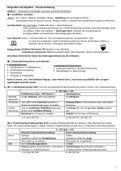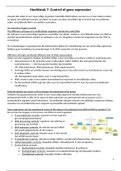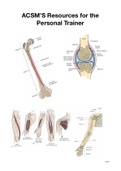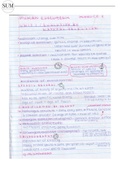Severe Mental Illness in Urban Context
Diagnosis in Context
Severe Mental Illness (SMI)
The National Institute of Mental Health (NIMH) defined SMI using the following criteria:
A. A major diagnosis of non-organic psychosis or personality disorder
Non-organic means that it is not a psychosis due to brain injury or dementia. But it is DSM
criteria: consistent delusions or hallucinations
B. Duration of at least 2 years
In order to speak of severe mental illness, this personality disorder or other kinds of complex
disorder endure at least 2 years.
C. At least 3/5 of the categories of functional disabilities
The 3Ds
1. Diagnosis: a major affective, non-organic psychotic disorder or a disorder that may lead
to a chronic disability such as BPD.
2. Duration: treatment history meets one or both of the following criteria:
a. Has undergone psychiatric treatment more intensive than outpatient care
more than once in a lifetime (e.g., crisis response services, alternative home
care, partial hospitalization)
b. Has experienced an episode of continuous, supportive residential care, other
than hospitalization, for a period long enough to have significantly disrupted
the normal living situation.
3. Disability: severe recurrent disability resulting from mental illness. The disability results
in functional limitations in major life activities. Individuals must meet at least two of the
following criteria on a continuing or intermittent basis:
a. Is unemployed, is employed in a sheltered setting or supportive work situation,
or has markedly limited skills and a poor work history
b. Requires public financial assistance from out-of-hospital maintenance and may
be unable to procure such assistance without help
c. Has difficulty in establishing or maintaining a personal social support system
d. Requires help in basic living skills such as hygiene, food prep, money
management
e. Exhibits inappropriate social behavior, resulting in intervention by the mental
and/or judicial system
• What we talk about severe mental illness is much more complex -- usually a
combination of various factors.
• The definition given by NIMH etc. is often spiced up by other factors.
• There are people with SMI that do not fit into each criteria -- the problem is that SMI is
very complex. Many factors. -- Also prone to an image that one may have regarding the
thought that these people are very off the grid.
The SIDDD dimensions of a definition of severe mental illness (Slade, Powell, & Strathdee,
1997):
• Safety has 4 components:
a. Unintentional self-harm, e.g. Self-neglect
, b. Intentional self-harm
c. Safety of others
d. Abuse by others, e.g. Physical, sexual, emotional, financial
• Informal and formal support has 2 components:
a. Help from informal carers, including friends & relatives
b. Help from formal services, i.e. Day centers, paid staff, voluntary services,
hospital admissions, medication and detention under the Mental Health Act.
• Diagnosis may include:
a. Psychotic illness
b. Dementia
c. Severe neurotic illness
d. Personality disorder
e. Developmental disorder
• Disability with impaired ability to function effectively in the community, which may
include problems with:
a. Employment and recreation
b. Personal care
c. Domestic skills
d. Interpersonal relationships
• Duration of any of the above, for periods which vary between 6 months and 2 years
"Difficult to treat patients": complexity of all these factors together to treat
• Resistance
• Rigid
• Stigma!
• Judgmental
• Hopelessness
• Criminal/inappropriate social behavior
Dual diagnosis (comorbidity)
• In combination with substance abuse, attachment problems
• Depressive or anxiety symptoms
• This image of people that they are hard to work with, hard to treat, irresponsive to
treatment, hard for them to show improvements, don't have insight (because they don't
understand what is going on with them)
• If one is treatment resistance, of course treatment is difficult
• However, this image of not being able to go forward completely on the patient.
Creates stigma… label…
(Urban) contextual factors:
• Poverty (debt)
• Low social-economic status
• Unemployment
Diagnosis in Context
Severe Mental Illness (SMI)
The National Institute of Mental Health (NIMH) defined SMI using the following criteria:
A. A major diagnosis of non-organic psychosis or personality disorder
Non-organic means that it is not a psychosis due to brain injury or dementia. But it is DSM
criteria: consistent delusions or hallucinations
B. Duration of at least 2 years
In order to speak of severe mental illness, this personality disorder or other kinds of complex
disorder endure at least 2 years.
C. At least 3/5 of the categories of functional disabilities
The 3Ds
1. Diagnosis: a major affective, non-organic psychotic disorder or a disorder that may lead
to a chronic disability such as BPD.
2. Duration: treatment history meets one or both of the following criteria:
a. Has undergone psychiatric treatment more intensive than outpatient care
more than once in a lifetime (e.g., crisis response services, alternative home
care, partial hospitalization)
b. Has experienced an episode of continuous, supportive residential care, other
than hospitalization, for a period long enough to have significantly disrupted
the normal living situation.
3. Disability: severe recurrent disability resulting from mental illness. The disability results
in functional limitations in major life activities. Individuals must meet at least two of the
following criteria on a continuing or intermittent basis:
a. Is unemployed, is employed in a sheltered setting or supportive work situation,
or has markedly limited skills and a poor work history
b. Requires public financial assistance from out-of-hospital maintenance and may
be unable to procure such assistance without help
c. Has difficulty in establishing or maintaining a personal social support system
d. Requires help in basic living skills such as hygiene, food prep, money
management
e. Exhibits inappropriate social behavior, resulting in intervention by the mental
and/or judicial system
• What we talk about severe mental illness is much more complex -- usually a
combination of various factors.
• The definition given by NIMH etc. is often spiced up by other factors.
• There are people with SMI that do not fit into each criteria -- the problem is that SMI is
very complex. Many factors. -- Also prone to an image that one may have regarding the
thought that these people are very off the grid.
The SIDDD dimensions of a definition of severe mental illness (Slade, Powell, & Strathdee,
1997):
• Safety has 4 components:
a. Unintentional self-harm, e.g. Self-neglect
, b. Intentional self-harm
c. Safety of others
d. Abuse by others, e.g. Physical, sexual, emotional, financial
• Informal and formal support has 2 components:
a. Help from informal carers, including friends & relatives
b. Help from formal services, i.e. Day centers, paid staff, voluntary services,
hospital admissions, medication and detention under the Mental Health Act.
• Diagnosis may include:
a. Psychotic illness
b. Dementia
c. Severe neurotic illness
d. Personality disorder
e. Developmental disorder
• Disability with impaired ability to function effectively in the community, which may
include problems with:
a. Employment and recreation
b. Personal care
c. Domestic skills
d. Interpersonal relationships
• Duration of any of the above, for periods which vary between 6 months and 2 years
"Difficult to treat patients": complexity of all these factors together to treat
• Resistance
• Rigid
• Stigma!
• Judgmental
• Hopelessness
• Criminal/inappropriate social behavior
Dual diagnosis (comorbidity)
• In combination with substance abuse, attachment problems
• Depressive or anxiety symptoms
• This image of people that they are hard to work with, hard to treat, irresponsive to
treatment, hard for them to show improvements, don't have insight (because they don't
understand what is going on with them)
• If one is treatment resistance, of course treatment is difficult
• However, this image of not being able to go forward completely on the patient.
Creates stigma… label…
(Urban) contextual factors:
• Poverty (debt)
• Low social-economic status
• Unemployment










